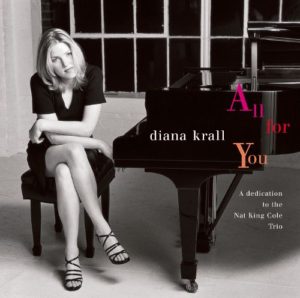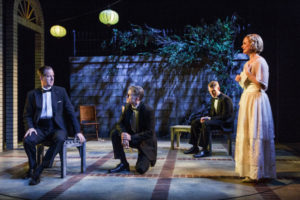Love-hungry bachelors of the Fifties and early Sixties were notorious for using jazz and romantic ballads to grease the skids. Frank Sinatra, I’m told, was their artist of choice, though I’ve also been assured by a number of senior citizens in a position to know that Getz/Gilberto was similarly effective. Blake Edwards notwithstanding, I’ve never met anyone who did it to Prokofiev’s Romeo and Juliet or Ravel’s Boléro, at least not more than once.
As for me, I’ve never been one to play music in intimate situations. Perhaps because I am, or used to be, a musician, I find it distracting. And I suppose it says something significant about me that while music is one of the most important things in my life–perhaps the most important thing–I don’t find it sexy, and never have….
Read the whole thing here.



 Some of my profiles changed the lives of their subjects for the better, none more so than “A Soulful Star in the Making,” which appeared in The Wall Street Journal on June 7, 1995. The occasion was the release of
Some of my profiles changed the lives of their subjects for the better, none more so than “A Soulful Star in the Making,” which appeared in The Wall Street Journal on June 7, 1995. The occasion was the release of  I didn’t include “A Soulful Star in the Making” in the
I didn’t include “A Soulful Star in the Making” in the  Distinctive as her singing is, Ms. Krall sees it as just one facet of a fully integrated small-group sound: “I want to focus on my trio as a unit, like a quartet, really, with the vocals on top. I don’t want my singing to be the whole focus. And I like everybody to have a lot of space. I especially like Ahmad Jamal’s old trio, the one with Israel Crosby and Vernel Fournier. That’s what I want: a group where the sidemen aren’t just playing the notes and reading the changes. I want them to take risks, to be completely contributing to the unique sound of the band.”
Distinctive as her singing is, Ms. Krall sees it as just one facet of a fully integrated small-group sound: “I want to focus on my trio as a unit, like a quartet, really, with the vocals on top. I don’t want my singing to be the whole focus. And I like everybody to have a lot of space. I especially like Ahmad Jamal’s old trio, the one with Israel Crosby and Vernel Fournier. That’s what I want: a group where the sidemen aren’t just playing the notes and reading the changes. I want them to take risks, to be completely contributing to the unique sound of the band.”
 It’s no surprise that playwrights naturally gravitate to the spectacular in preference to the commonplace. It takes a special kind of writer to find compelling beauty in the ordinary, and Horton Foote did it better than anyone. Witness Michael Wilson’s revival of “The Roads to Home,” Foote’s 1982 triptych of tightly intertwined one-act plays whose subject is the melancholy that pierces the souls of women who can’t go home again. On the surface, scarcely anything happens in “The Roads to Home,” a conversation piece whose gossipy characters fritter away their days chatting about what seems to be nothing in particular. But Mr. Wilson, Foote’s protégé, knows that the talk in his plays is far from aimless, and this richly involving Primary Stages revival serves as a reminder that you needn’t set off firecrackers to seize an audience’s attention….
It’s no surprise that playwrights naturally gravitate to the spectacular in preference to the commonplace. It takes a special kind of writer to find compelling beauty in the ordinary, and Horton Foote did it better than anyone. Witness Michael Wilson’s revival of “The Roads to Home,” Foote’s 1982 triptych of tightly intertwined one-act plays whose subject is the melancholy that pierces the souls of women who can’t go home again. On the surface, scarcely anything happens in “The Roads to Home,” a conversation piece whose gossipy characters fritter away their days chatting about what seems to be nothing in particular. But Mr. Wilson, Foote’s protégé, knows that the talk in his plays is far from aimless, and this richly involving Primary Stages revival serves as a reminder that you needn’t set off firecrackers to seize an audience’s attention….